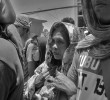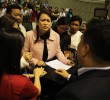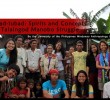The big gainers in the recent political bout, where 80,000 candidates fought for 18,000 elective positions, were the heavyweights or the political families.
(First of two parts)
By the Policy Study, Publication and Advocacy (PSPA)
Center for People Empowerment in Governance (CenPEG)
MANILA — The Arroyo administration prevailed in the race for the House of Representatives and local government positions during the May 14 mid-term polls through a coalition of political clans and dynasties. The cheating, vote-padding and �shaving, vote buying and other irregularities that mired the contest for the Senate and Party-lists were also wantonly committed in the congressional derby and local elections albeit under-reported unlike in the first two races.
United by short-term political convenience of retaining power, the pro-Arroyo clans and dynasties were brought together into a broad coalition of various political parties whose function is chiefly for election purposes. In the recent elections, the coalition of Team Unity (TU) included Lakas-CMD, led by House Speaker Jose de Venecia; Eduardo “Danding” Cojuangco and his Nationalist People’s Coalition (NPC); Arroyo’s own Kampi, led by Luis Villafurte; and the “social democrats”‘ Partido Demokratiko Sosyalista ng Pilipinas (PDSP) of National Security Adviser Norberto Intengan and Jesuit Fr. Romeo Intengan.
A new element in this pro-Arroyo coalition was the network of Party-list groups, numbering more than 22, that was fielded reportedly by Arroyo’s political operatives and supported in the regions by her main political allies, political clans, and by military and police operatives.
At the back of this big election machine were the pro-Arroyo political clans. The weapon: patronage politics.
Patronage politics galvanized this coalition of political clans and dynasties, most of whose members had earlier switched to the ruling coalition for self-perpetuation. Clearly, the immediate objective of Mrs. Arroyo in the May elections was to pre-empt a third impeachment being filed against her over the 2004 rigged presidential elections by ensuring the numerical superiority of administration allies in the House.
Pork barrel
The political clans and dynasties were reined in by the President’s control of the disbursement of priority development assistance fund (PDAF) amounting to P11.45 billion in 2007 in addition to the P130 billion discretionary fund and P183 billion internal revenue allotments (IRA). These were aside from other perks, contracts, “development projects,” investments and incentives that the seating President could dangle to her would-be allies to address her short-term political objectives.
While patronage politics boosts the centralization of powers and ensures the continuity of the tenure of the chief executive, it also helps sustain the network of political clans’ domination of elective positions in Congress (the Senate and House of Representatives) and in the local government units (LGUs or the provincial and municipal/city governments). Political dynasties � numbering at least 260 at the latest count � as well as other emerging political families are propped up by the economic base that they possess in their own fiefdoms. But their control of elective and appointive positions is not assured without the support of the President and the clique of political giants and rulemakers closely linked to the central power. In the recent elections, the short-term exigency of presidential survival came in harmony with the generational interests of the political dynasties.
This is not to gloss over the fact that the Genuine Opposition (GO) coalition also mobilized its own clans and dynasties through the electoral machineries of the Partido ng Masang Pilipino (PMP) of the Estradas, Nationalista Party led by Manuel Villar, Liberal Party of the Drilon wing, PDP-Laban of the Pimentels and Binays, and a few who ran as independent candidates. TU, however, claims to have won more than 190 of the House regular seats and majority of the gubernatorial and mayoral positions in the provinces.
The big gainers in the recent political bout, where 80,000 candidates fought for 18,000 elective positions were the heavyweights or the political families. Most of them retained their seats in Congress. Still many families increased the number of elective posts they hold, amassing seats in the Senate and the House, as well as the highest positions in the provincial and municipal governments.
Spouses, siblings
So far, partial results of the elections show that 106 of the elected and reelected legislators came from political clans; in the 13th Congress, they numbered around 162. Losses in the bids for either the Senate or House were compensated by having spouses, siblings and children get elected or reelected in the gubernatorial and mayoralty contests.
Aside from the Macapagal-Arroyo clan, the big gainers in the elections are the Garcias of Cebu, the Aquino-Cojuangco clan of Central Luzon and Negros, the Singsons and Angaras. (See Election Forensics No. 03) On the opposition side, the Villars of Las Pi�as, Cayetanos of Taguig-Pateros, and Escuderos of Sorsogon are displaying victory smiles as big as the number of seats they have amassed.
Of these and about 400 other political families spread in the country’s 81 provinces, emerging as the dominant dynasties today in terms of the extensiveness and magnitude of political influence are the Macapagal-Arroyos and the Aquino-Cojuangco clan.
Under Arroyo, the political dynasty that anchors at Malaca�ang now navigates Camarines Sur in Southern Luzon, Pampanga in Central Luzon and Negros Occidental in Western Visayas. Proclaimed as congressmen are sons Diosdado “Dato” Arroyo (1st district, Camarines Sur) and reelectionist Mikey Arroyo (2nd district, Pampanga). In faraway, sugar-rich Negros Occidetal, Ignacio “Iggy” Arroyo, a brother-in-law, regained his seat (5th district). The Macapagal-Arroyo clan has held government positions for 58 years, with two presidencies clinched: patriarch Diosdado Macapagal (1962-1965) and daughter Gloria (2001-present). The Macapagal-Arroyo dynasty holds its fort through its electoral arm, Kampi.
Former Rep. Jose “Peping” Cojuangco, Jr. may have lost the gubernatorial post of Tarlac to Victor Yap, who also belongs to a political family, but the political kingdom that he and relatives rule is well-entrenched. Nephew Benigno “Noynoy” Aquino III is a sure winner in the Senate, where the latter’s assassinated father, Benigno, Jr., used to be a filibuster during the pre-martial law period. Jeci Lapus, a cousin of Benigno, Jr. and brother of Education Secretary Jesli Lapus, has been elected congressman (3rd district, Tarlac). Monica Louise Teodoro, wife of Gilberto Teodoro, Jr., won a House seat (1st district, Tarlac). Teodoro, Jr. is a nephew of former Marcos crony and political kingpin Eduardo “Danding” Cojuangco, Jr., estranged cousin of former President Corazon Cojuangco-Aquino.
Moreover, Danding’s son, Marcos, Jr., was reelected congressman in Pangasinan (4th district) while the seat of another son, Carlos, in Negros Occidental (4th district) is now held by Jeffrey N. Ferrer, who is from Danding’s NPC. Ma. Carmen Cojuangco, wife of Marcos, Jr., won as mayor of Sison, Pangasinan.
The patriarch of the Aquinos, Servillano Aquino, served in the Malolos Congress of 1898 while Melecio Cojuangco, grandfather of Corazon, was a member of the Philippine Assembly in 1907. (CENPEG)
2007 Elections, Analysis
![[STANDPOINT] Illegal drugs and the NIMBY mindset](https://davaotoday.com/wp-content/uploads/2016/09/Mags-Maglana_UPMIN-Sept.-20-110x100.jpg)








